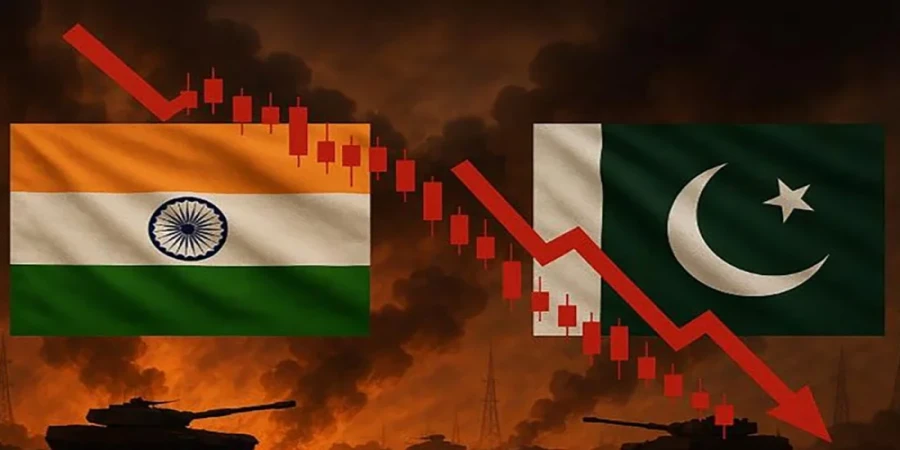
ছবি: Photo: Collected
Amid escalating tensions between India and Pakistan, both countries witnessed significant turmoil in their stock markets on Thursday. Trading activity was disrupted due to rapid price declines, prompting emergency shutdowns and heightened concern among investors.
India’s two major benchmark indices, the Sensex and Nifty, recorded a drop of nearly half a percent by the close of trading. The decline followed increasing geopolitical strain after both nations accused each other of launching drone attacks. The tension has added to investor anxiety, leading to widespread sell-offs in key sectors.
In Pakistan, the Karachi Stock Exchange experienced even sharper volatility. Investor sentiment turned sharply negative, resulting in heavy selling across multiple sectors. The market saw a dramatic fall in share values, with trading volumes plummeting by more than six percent. The rapid decline triggered an automatic halt in trading activity to contain the volatility and prevent further market panic.
The fallout extended beyond the equity markets. Both countries' currencies depreciated against the US dollar amid the uncertainty. The Indian rupee fell by more than one percent, reflecting investor unease and capital outflows. Similarly, the Pakistani rupee saw a decline, driven by fears of further instability and external pressure on the economy.
Currency traders noted that the forex markets responded to geopolitical developments with increased caution. The perception of growing military risk and a potential disruption to cross-border economic activity has led to a weakening of investor confidence. Analysts observed that the continued tension could have lasting impacts on foreign investment and trade flows in both countries.
Market observers believe that unless a de-escalation occurs, financial markets in the region may remain volatile in the coming days. Economic analysts also warned that if diplomatic channels fail to resolve the situation, both economies could face broader challenges, including inflationary pressures and reduced investor participation.
Despite assurances from officials in both New Delhi and Islamabad about efforts to maintain internal financial stability, market participants appear unconvinced amid the ongoing political rhetoric. Financial institutions are reportedly adopting a cautious approach, with some advising clients to reduce exposure to regional equities and hold safe-haven assets until clearer signals emerge.
In addition to stock and currency markets, bond yields in both countries saw slight increases, indicating higher risk premiums demanded by investors. This reflects concerns that fiscal stress could intensify if the geopolitical situation deteriorates further.
As of now, there has been no official confirmation of when normal trading operations will resume in the Karachi Stock Exchange. Indian markets are expected to open as scheduled on the next business day, but with close monitoring by regulatory authorities.
The ongoing conflict-related concerns underscore the fragile nature of investor sentiment in South Asia, where political developments often exert immediate pressure on financial markets. Economic commentators suggest that a coordinated diplomatic effort will be essential to restore confidence and mitigate further financial damage.
Until then, both governments face the challenge of balancing national security considerations with economic stability, as markets await signs of easing tension and renewed confidence in the region’s investment outlook.
repoter





